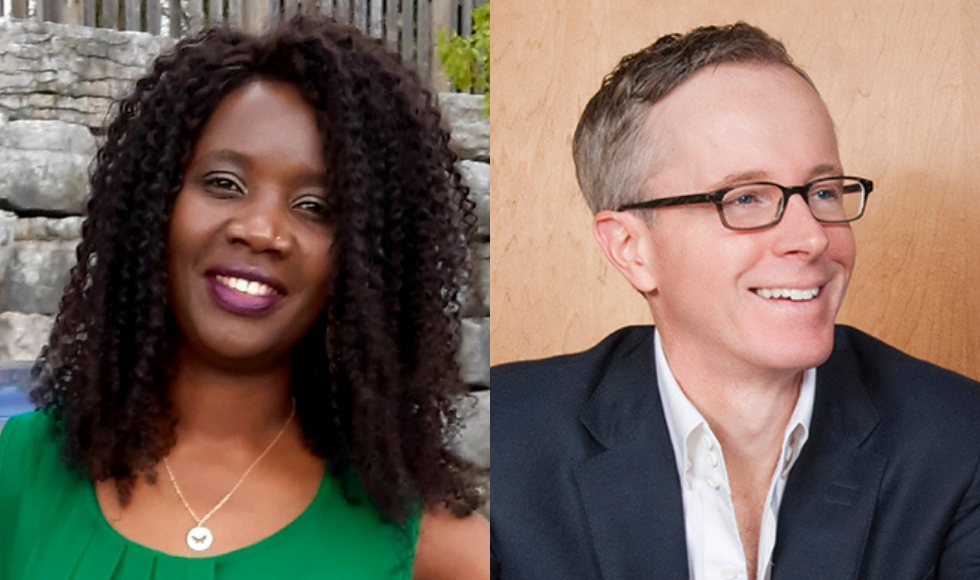McMaster projects offer experiential learning opportunities for emerging student leaders

Selina Mudavanhu is the director of the McMaster African and Caribbean Leadership Exchange (MACLeads). John Lavis is the director of the McMaster Health Forum which is offering the Developing Skilled Future Leaders in Strengthening Health and Social Systems project.
Emerging student leaders at McMaster can gain insight into global challenges through unique experiential learning opportunities offered through two projects that have recently received federal funding.
The McMaster African and Caribbean Leadership Exchange (MACLeads) and Developing Skilled Future Leaders in Strengthening Health and Social Systems both offer McMaster students the opportunity to study and work overseas.
Funded by Global Skills Opportunity, part of Canada’s International Education Strategy, the two multi-year projects aim to diversify the destination countries typically made available to students and are geared towards students who have been typically under-represented in international study/work programs.
Learn more about these global engagement programs at the university below.
McMaster African and Caribbean Leadership Exchange (MACLeads)
The McMaster African and Caribbean Leadership Exchange (MACLeads) program has been designed to afford young, emerging and under-represented leaders in Canada experiential learning opportunities through placements with African or Caribbean partner institutions and organizations.
The project, which was borne out of a collaborative effort by a multi-disciplinary team who are part of the African and Caribbean Faculty Association of McMaster (Alpha Abebe, Juliet Daniel, Jamal Deen, Bonny Ibhawoh, Lydia Kapiriri, Selina Mudavanhu and Faith Ogunkoya), is also meant to enhance the education of undergraduate students from all faculties across campus.
The project prioritizes students who have historically faced barriers to participating in global exchange initiatives due to lack of awareness and funds, non-targeted outreach, and/or lack of culturally relevant opportunities. MACLeads specifically targets first-generation, differently abled, Indigenous, Black, LatinX and other racialized students.
Selina Mudavanhu, an assistant professor in communication studies and media arts and director of MACLeads, says by focusing on opportunities in Africa and the Caribbean, the project allows McMaster students to widen and challenge narrow perspectives of the Global South. Further, MACLeads offers students unique opportunities to interact with and learn from global leaders who are mostly Black or racialized at post-secondary institutions, policy institutes and non-governmental organizations in Barbados, Jamaica, Trinidad and Tobago, Ghana, South Africa and Uganda.
So far, the University for Development Studies (UDS) in Ghana and the University of the West Indies (UWI) at Cave Hill in Barbados are partnering with McMaster University on this project.
“If you are thinking about Black excellence, for example, it is important for students to go to countries where that is embodied; countries where they will interact with many Black people who are high achievers and successful leaders in their areas of specialization. Seeing many Black people in these roles is not something that is necessarily conspicuous in Canada given that Black people are ethnocultural minorities,” says Mudavanhu.
Mudavanhu explains further that sending students to the aforementioned destinations contests discourses that characterize countries in the Global South as deficient. Contrary to the stereotypes, these countries have much to offer Canada and the world.
McMaster students who will be part of the MACLeads project will gain academic credit while completing four-month work and/or research placements.
Reflecting on partnerships between McMaster and institutions in the aforementioned countries, Mudavanhu states that an important consideration is ensuring they are symbiotic.
“We are envisioning partnerships that will be mutually beneficial for McMaster as well as our partners. McMaster students should not be the sole beneficiaries in this project. In conversation with our partners, we are exploring ways their students can also benefit.”
Given travel restrictions due to the COVID-19 pandemic, the first year of the program is taking place virtually, with the hope that physical placements will follow in subsequent years of the project. In all, 77 students are expected to take part in the program over the course of four years.
Developing Skilled Future Leaders in Strengthening Health and Social Systems
Over the next four years, the Developing Skilled Future Leaders in Strengthening Health and Social Systems project will facilitate meaningful international experiences for 40 students by integrating them into projects focused on real-world initiatives.
The project, which is offered through the McMaster Health Forum, aims to build future Canadian leaders who can help in the Forum’s goal to strengthen health and social systems – locally, nationally, and internationally.
Students will gain a foundation of knowledge by working alongside senior scientific staff to support the Forum’s programs, which use best available research evidence to generate action on the pressing health- and social- system issues of our time.
Participants will then apply this foundational knowledge by working with one of McMaster’s international research partners through an internship or applied research position in a health and medical research institute, government ministry or research organization setting.
“The McMaster Health Forum aims to improve health outcomes around the world through collective problem-solving. This program is a great example of that,” says Forum director John Lavis.
“Students will not only build skills in policy, political and systems analysis, evidence syntheses and stakeholder engagement, but will help strengthen capacity among international partner organizations to address their health- and- social-system priorities.”
Students from low-income backgrounds, students with disabilities and Indigenous students will be prioritized for the project, with campus partners helping highlight students who could benefit from participation.
Students will have the opportunity to travel to countries like China, Colombia, India, Lebanon, Malaysia, South Africa and Trinidad and Tobago to work with existing McMaster partners.
“Students will benefit from the Forum’s extensive network of international partners, which includes those working to find and use the best available evidence to support decision making around COVID-19,” says Lavis.
Because of the global pandemic, the program aims to begin virtual programming in April 2022 and international placements are set to begin in September 2022.


